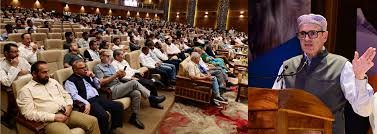Srinagar, September 12, 2025 : Chief Minister Omar Abdullah today committed that his government would take prompt action on the recommendations from the Second International Conference on Hangul Protection and Other Threatened Ungulates Conservation (2IHUC-25). He emphasized the need for measurable progress in conserving the Hangul and Markhor populations before the next conference.
Speaking at the valedictory session of the three-day international conference held at Sher-e-Kashmir University of Agricultural Sciences and Technology of Kashmir (SKUAST-K), Shalimar campus, the Chief Minister, who also serves as Pro-Chancellor of SKUAST-K, addressed a distinguished gathering of conservationists, scientists, policymakers, and international delegates.
“On behalf of my colleagues in government, I assure you that the recommendations emerging from this conference will be implemented at the earliest. My hope is that when we meet here next time, the population of Hangul and Markhor will have grown significantly,” the Chief Minister asserted.
Omar Abdullah recalled the words of eminent conservationist M.K. Ranjitsinh, emphasizing that conservation is deeply connected to human well-being.
“Conservation is not only about animals—it is about human survival itself. Protecting Hangul, Markhor, or any threatened species is essentially about protecting life and the delicate ecological balance we depend upon,” he said.
Expressing personal regret, the Chief Minister shared that despite living near Dachigam National Park, he had never seen a Hangul in the wild.
“I don’t want a situation where our children and grandchildren know these species only through photographs in books, like the dodo or woolly mammoth. That would be a tragedy we must not allow,” he added.
Stressing the need for effective cooperation, the Chief Minister underlined the importance of synergy between academic research and government agencies to ensure tangible results.
“Unless there is synergy between academic research and government implementation, we risk losing magnificent animals like the Hangul. Every species exists for a reason. When they thrive, ecosystems thrive—and when ecosystems thrive, humankind thrives as well,” he remarked.
He further cautioned against bureaucratic delays, saying:
“These species will not wait for files to move from one department to another. The findings of this conference must translate into action with urgency.”
Omar Abdullah thanked international and national delegates for their participation and expressed hope that such collaborative platforms would be held more frequently. The three-day event drew over 200 delegates, including wildlife experts, conservationists, and biologists from the United States, United Kingdom, Canada, Middle East, Central Asia, and South Asia. Discussions focused on research, innovative strategies, and sustainable models for the conservation of Hangul, Markhor, and other threatened ungulates in the Himalayan region.
During the event, the Chief Minister released a Vision Document titled ‘Institute of Mountain Wildlife Sciences’ and distributed awards and appreciation certificates to participants for their valuable contributions.
Other key speakers included Forest Minister Javed Ahmed Rana, Advisor to the CM Nasir Aslam Wani, Vice Chancellor SKUAST-Kashmir Prof. Nazir A. Ganie, Principal Chief Conservator of Forests Suresh Gupta, and international expert Dr. Gonzalez.
Reiterating his commitment to wildlife conservation, Omar Abdullah concluded:
“That is my hope, that is my belief, and I am sure that if we approach it the right way—as we saw success with Project Tiger and encouraging signs with Hangul and Markhor—that success will continue to grow.”



















